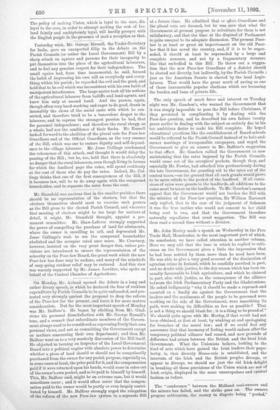The only speech of much force and interest on Tuesday
night was Mr. Goschen's, who warned the Government that it was simply impossible to pass the Bill before Christmas, if they persisted in complicating it by dealing with the Poor-law question, and he described his own failure twenty years earlier in dealing with the subject as entirely due to his too ambitions desire to make his Bill complete. He hoped educational questions like the establishment of Board-schools would be referred to the Parish Council instead of to hole-and- corner meetings of irresponsible ratepayers, and urged the Government to give an answer to Mr. Balfour's suggestion to that effect. Mr. Goschen rallied the Government on now maintaining that the rates imposed by the Parish Councils would come out of the occupiers' pockets, though they, and especially Mr. Fowler, had attacked him pertinaciously during the late Government, for granting aid to the rates out of the central taxes,—on the ground that all such grants would prove to be mere reliefs to the pocket of the landlord. If all remis- sions of rates were grants to the landlords, all additions to the rates must be taxes on the landlords. To Mr. Goschen's earnest appeal that the Government would not burden the Bill with the solution of the Poor-law question, Sir William Harcourt only replied, that in the case of the judgment of Solomon it was the true mother who would not consent to her child being rent in two, and that the Government therefore naturally repudiates that cruel suggestion. The Bill was then read a second time without a division.






































 Previous page
Previous page